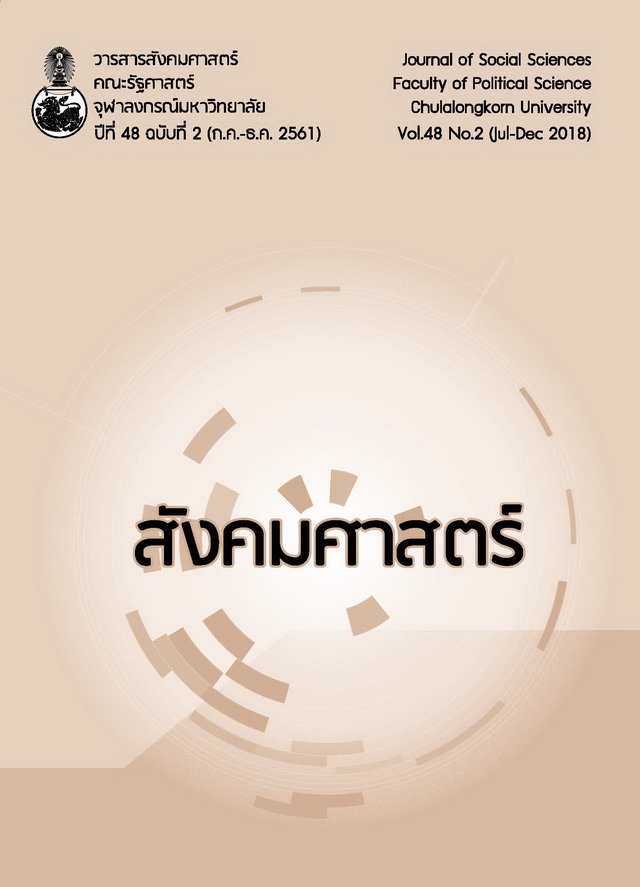ความชอบธรรมและการล้มล้างทรราช มุมมองของลัทธิขงจื่อในประวัติศาสตร์จีน
DOI:
https://doi.org/10.61462/cujss.v48i2.752คำสำคัญ:
ความชอบธรรม, การล้มล้างทรราช, ลัทธิขงจื่อ, อาณัติแห่งฟ้า, คุณธรรมของผู้ปกครองบทคัดย่อ
แหล่งที่มาของความชอบธรรมในการปกครองตามมุมมองของลัทธิขงจื่อมีแหล่งที่มาจากสองแหล่ง คือ อาณัติแห่งฟ้าและคุณธรรมส่วนบุคคลของผู้ปกครอง ลัทธิขงจื่อถือว่าผู้ปกครองทุกคนไม่ว่าเถลิงสู่อำนาจด้วยการสืบสันตติวงศ์หรือจากการกำราบทรราช ล้วนถือว่าได้รับอาณัติแห่งฟ้าด้วยกันทั้งสิ้น แต่คุณธรรมส่วนบุคคลเป็นปัจจัยสำคัญที่ตัดสินว่าผู้ปกครองผู้นั้นจะรักษาอาณัติแห่งฟ้าได้หรือไม่ และเพื่อควบคุมผู้ปกครองให้อยู่ในครรลองคลองธรรม แม้ปรัชญาการปกครองของลัทธิขงจื่อจะมีความเป็นอนุรักษ์นิยมอย่างสูง ภายใต้การอ้างอิงคุณธรรมจริยธรรมและการยึดมั่นจารีตอย่างเคร่งครัด แต่กลับนำเสนอวาทกรรมต่อต้านอำนาจเพื่อนำไปสู่การล้มล้างการปกครองอย่างมีความชอบธรรมด้วยเช่นกัน
Downloads
เอกสารอ้างอิง
Chen, Guying.2007. ZhuangziJinzhu Jinyi. [The Works of Zhuangzi in Modern Chinese Translation]. Beijing: The Commecial Press. (in Chinese)
Gao, Wang, and Zhang Sanxi. 2010. Hanfeizi. [The Works of Hanfeizi in Modern Chinese Translation]. Beijing: Zhonghua Book Company. (in Chinese)
He, Lin. 1996. Wulun Guannian de Xin Jiantao. [Critically Examining the Concept of Five Relationships]. Beijing: The Commercial Press. (in Chinese)
Jin, Guantao, and Liu Qingfeng. 2011. Zhongguo Xiandaisixiang de Qiyuan: Chaowending jiegou Yu Zhongguo Zhengzhi Wenhua de Yanbian. [The Cycles of Growth and Decline on Ultrastable Chinese Society]. Beijing: The Law Press. (in Chinese)
Liu, Zehua, and Ge Quan, eds. 2001. Zhongguo Gudai Zhengzhi Sixiangshi. [A History of Ancient Chinese Political Thought]. Tianjin: Nankai University Press. (in Chinese)
Sun, Jiazhou. 1987. “Xianqin Zhuzi Lun ‘Tangwu Gemming.’” [The Discussion of ‘the Tang and Wu Revolts’ by Hundred Schools of Thought]. Social Science Research 9(1): 112–114. (in Chinese)
Tang,Yijia, and Li Zhonghua, eds. 2011. Zhongguo Ruxueshi: Songyuan Juan. [A History of Chinese Confucian Thought: Song Yuan Periods]. Beijing: Peking University Press. (in Chinese)
Weibo, Makesi. 2004. Weibo Zuopinji II Jingji Yu Lishi Zhipei de Leixing. [Selected works of Weber II Economy and Society: The Three Types of Legitimate Rule]. Nanning: Guangxi Normal University Press. (in Chinese)
Wu, Huan. 2014. “Guozhi Linghun: Xianqin ‘Tianming-Geming’ Guan Ji Qi Fazhexue Yihan.” [The Spirit of the Political System of the State: Pre-Qin Viewpoints and Philosophy on the Significance of “the Mandate of Heaven – the Revolution”]. Yuandao 9(1): 164–178. (in Chinese)
Yu, Jingang. 2010. “Rujia Chuantong Geming Huayu de Jindai Zhuanhua.” [Change in the Modern Times of Revolutionary Discourse in Traditional Confucian Thought]. Qianyan 17(22): 128–131. (in Chinese)
Zhao, Kangtai, and Li Yinghua. 2006. Zhongguo Chuantong Sixiang Zhengzhijiaoyu Lilun Shi. [The Tradition of Chinese Confucian Thought: A History of Political Education Theories]. Wuhan: Central China Normal University Press. (in Chinese)
Zhou, Guidian. 2001. Tianminglun Yu Zhongguo Gudai Zhexue. [The Mandate of Heaven Theory and Ancient Chinese Philosophy]. Southeast University Philosophy and Social Science Journal 3(3): 14-19. (in Chinese)
Zhu, Xi, comp. 2010. Sishu Zhangju Jizhu. [The Four Books: Annotated]. Beijing: Zhonghua Book Company. (in Chinese)
ดาวน์โหลด
เผยแพร่แล้ว
รูปแบบการอ้างอิง
ฉบับ
ประเภทบทความ
สัญญาอนุญาต
ลิขสิทธิ์ (c) 2018 คณะรัฐศาสตร์ จุฬาลงกรณ์มหาวิทยาลัย

อนุญาตภายใต้เงื่อนไข Creative Commons Attribution-NonCommercial-NoDerivatives 4.0 International License.
เงื่อนไขการอนุญาตสาธารณะ
นโยบายลิขสิทธิ์และการอนุญาต
วารสารสังคมศาสตร์ จุฬาลงกรณ์มหาวิทยาลัย เผยแพร่เนื้อหาทั้งหมดภายใต้ สัญญาอนุญาตครีเอทีฟคอมมอนส์แบบแสดงที่มา-ไม่ใช้เพื่อการค้า-ไม่ดัดแปลง 4.0 นานาชาติ (CC BY-NC-ND 4.0)
ลิขสิทธิ์
บทความทั้งหมดที่ตีพิมพ์ในวารสารสังคมศาสตร์ จุฬาลงกรณ์มหาวิทยาลัย เป็นลิขสิทธิ์ของ คณะรัฐศาสตร์ จุฬาลงกรณ์มหาวิทยาลัย ผู้เขียนจะโอนสิทธิ์ทั้งหมดให้แก่วารสารเมื่อบทความได้รับการตอบรับให้ตีพิมพ์
สัญญาอนุญาต CC BY-NC-ND 4.0
ภายใต้สัญญาอนุญาตนี้:
-
แสดงที่มา (BY): ผู้ใช้ต้องแสดงที่มาโดยอ้างอิงถึงผู้เขียน คณะรัฐศาสตร์ จุฬาลงกรณ์มหาวิทยาลัย และวารสารสังคมศาสตร์ จุฬาลงกรณ์มหาวิทยาลัย พร้อมทั้งให้ลิงก์ไปยังสัญญาอนุญาต และระบุหากมีการเปลี่ยนแปลง ทั้งนี้สามารถทำได้ในลักษณะที่สมเหตุสมผล แต่ต้องไม่ทำในลักษณะที่แสดงว่าผู้อนุญาตให้การรับรองผู้ใช้หรือการใช้งานดังกล่าว
-
ไม่ใช้เพื่อการค้า (NC): ผู้ใช้ไม่สามารถใช้เนื้อหาเพื่อวัตถุประสงค์ทางการค้า การใช้งานเชิงพาณิชย์จะต้องได้รับอนุญาตเป็นลายลักษณ์อักษรล่วงหน้าจากผู้เขียนและคณะรัฐศาสตร์ จุฬาลงกรณ์มหาวิทยาลัย
-
ไม่ดัดแปลง (ND): หากผู้ใช้นำเนื้อหาไปรวม ดัดแปลง หรือต่อยอด ผู้ใช้ไม่สามารถเผยแพร่งานที่ดัดแปลงนั้นได้ การดัดแปลงผลงานจะต้องได้รับอนุญาตเป็นลายลักษณ์อักษรล่วงหน้าจากผู้เขียนและคณะรัฐศาสตร์ จุฬาลงกรณ์มหาวิทยาลัย
นโยบายการเข้าถึงแบบเปิด
วารสารสังคมศาสตร์ จุฬาลงกรณ์มหาวิทยาลัย ให้การเข้าถึงเนื้อหาแบบเปิดโดยทันทีตามหลักการที่ว่าการทำให้งานวิจัยสามารถเข้าถึงได้อย่างเสรีแก่สาธารณะจะสนับสนุนการแลกเปลี่ยนความรู้ในระดับโลก ผู้ใช้สามารถอ่าน ดาวน์โหลด คัดลอก เผยแพร่ พิมพ์ ค้นหา หรือเชื่อมโยงไปยังเนื้อหาฉบับเต็มของบทความได้โดยไม่ต้องขออนุญาตล่วงหน้าจากผู้จัดพิมพ์หรือผู้เขียน ทั้งนี้เป็นไปตามสัญญาอนุญาต CC BY-NC-ND 4.0
นโยบายการเก็บบันทึกด้วยตนเอง
ผู้เขียนสามารถเก็บบันทึกบทความฉบับตีพิมพ์สุดท้าย ต้นฉบับที่ส่ง (preprint) หรือฉบับที่ผ่านการประเมิน (postprint) ในคลังสถาบันหรือเว็บไซต์ส่วนตัวได้ โดยต้องมีการอ้างอิงการตีพิมพ์ครั้งแรกในวารสารสังคมศาสตร์ จุฬาลงกรณ์มหาวิทยาลัย พร้อมระบุแหล่งอ้างอิงที่สมบูรณ์และลิงก์ไปยังเว็บไซต์ของวารสาร
การขออนุญาต
สำหรับการใช้งานนอกเหนือจากที่ครอบคลุมโดยสัญญาอนุญาต CC BY-NC-ND 4.0 กรุณาติดต่อ:
กองบรรณาธิการ
วารสารสังคมศาสตร์ จุฬาลงกรณ์มหาวิทยาลัย
คณะรัฐศาสตร์ จุฬาลงกรณ์มหาวิทยาลัย
Email: cusocscij@gmail.com
สำหรับข้อมูลเพิ่มเติมเกี่ยวกับสัญญาอนุญาตครีเอทีฟคอมมอนส์แบบแสดงที่มา-ไม่ใช้เพื่อการค้า-ไม่ดัดแปลง 4.0 นานาชาติ กรุณาเยี่ยมชม: https://creativecommons.org/licenses/by-nc-nd/4.0/deed.th





